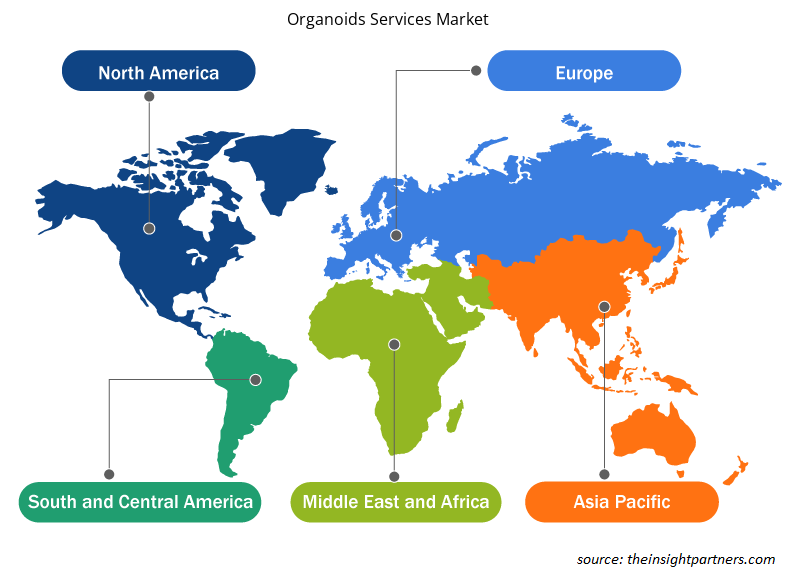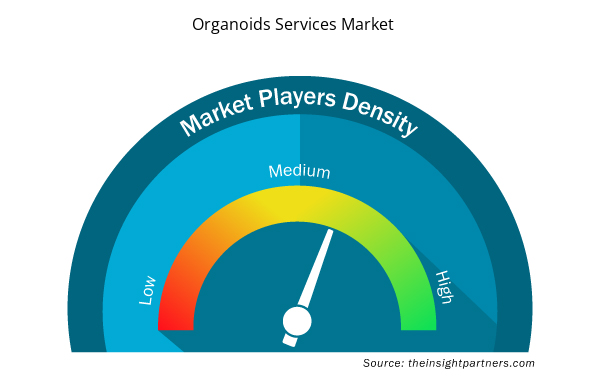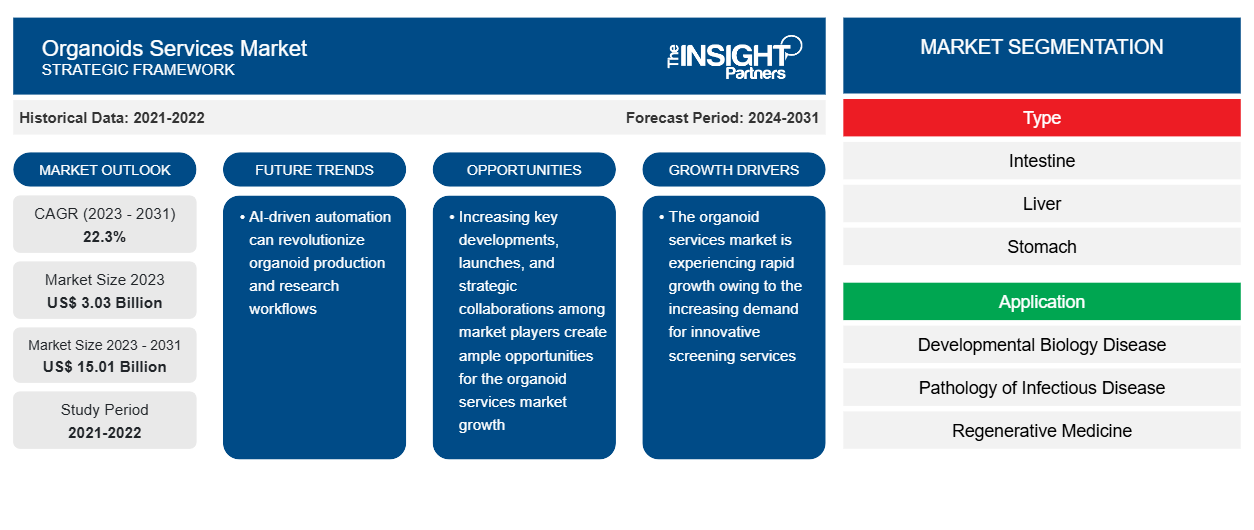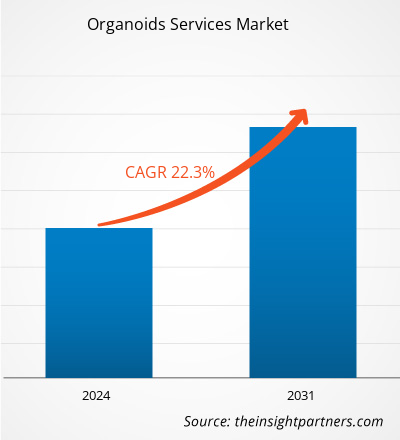类器官服务市场规模预计将从 2023 年的 30.3 亿美元增至 2031 年的 150.1 亿美元。预计 2023-2031 年该市场的复合年增长率将达到 22.3%。人工智能的整合很可能成为未来类器官服务市场的主要趋势之一。
类器官服务市场分析
类器官服务市场增长的因素包括对新型药物筛选服务的需求不断增长,以及定制药物的普及度不断上升。然而,缺乏熟练的专业人员和严格的安全法规阻碍了市场的增长。
类器官服务市场概览
随着研究人员和药物开发人员寻求更有效、更准确的方法来识别有希望的候选药物并预测其疗效,类器官正成为他们的一项强大资产。生成患者来源的类器官 (PDO) 的能力为个性化药物筛选开辟了令人兴奋的可能性。与传统的 2D 细胞培养相比,类器官是药物筛选的真实且相关的模型。它们模仿人体器官的复杂性,包括其细胞组成、结构和功能,更准确地表示药物在人体中的反应。这使研究人员能够更有信心地识别潜在的候选药物,并避免临床试验中昂贵且耗时的挫折。由于对创新筛选服务的需求不断增加,类器官服务市场正在快速增长。
定制此报告以满足您的需求
您可以免费定制任何报告,包括本报告的部分内容、国家级分析、Excel 数据包,以及为初创企业和大学提供优惠和折扣
- 获取此报告的关键市场趋势。这个免费样品将包括数据分析,从市场趋势到估计和预测。
类器官服务市场驱动因素和机遇
个性化药物的流行推动类器官服务市场发展
个性化医疗或精准医疗是根据预计的反应或疾病风险,针对个体患者量身定制治疗或药物的研究。根据个性化医疗联盟 (PMC) 发布的一项研究,个性化药物批准在 FDA 批准的新分子实体总数中所占的比例从 2005 年的 5% 上升到 2016 年的 25% 以上。此外,73% 的研发化合物是潜在的肿瘤候选药物,42% 的药物有潜力成为个性化疗法。生物制药公司在个性化药物方面的研发投资几乎翻了一番。此外,在未来几年,这笔支出预计将激增 33%。此外,生物制药领域的研究人员预计,在此期间,定制药物的开发将增加 69%。根据 PMC 于 2021 年发表的最新研究,美国市场上的定制药物数量已从 2016 年的 132 种跃升至 2020 年的 286 种。该信息是通过跟踪 PMC 自 2008 年以来的个性化药物数量得出的。使用类器官制定定制药物方案对增强患者护理具有重要前景。药剂师积极努力促进和提高精准医疗的认识,在推动定制药物需求方面发挥着至关重要的作用。根据 2021 年 NCBI 期刊上发表的最新研究,超过 50% 的消费者更喜欢购买定制商品或服务。这些统计数据表明,有利于类器官服务市场增长的环境正在形成。
公司为类器官服务市场增长创造机会的关键发展
医疗保健行业的进步导致全球对类器官的需求增加。这种需求的增长促进了全球范围内的新产品开发、收购、合作、产品发布和批准。主要市场参与者参与活动以确保高效服务和产品的创新和开发。以下列出了一些最近的关键发展:
- 2024 年 6 月,Molecular Devices, LLC. 在英国卡迪夫正式启用了其专用设施。该设施耗资数百万英镑,旨在适应该企业独有的生物工艺工作流程和创新的生物反应器技术,从而实现大规模、质量可控的 PDO 生产。大量可重复的 3D 就绪 PDO 可作为定制服务提供,并以随时可进行分析的方式进行冷冻保存。研究人员可以在需要时解冻、装盘并使用这些产品。
- 2024 年 1 月,HUB Organoids (HUB) 面向全球市场推出了 IntegriGut Screen 服务。该筛选服务采用 IBD PDO 单层细胞,确保提供高质量的上皮屏障功能人体数据,从而帮助开发新型 IBD 疗法。
- 2023 年 7 月,Molecular Devices 推出了定制类器官线扩增服务,该服务采用独特的生物工艺技术,适用于高通量应用。
- 2023 年 7 月,Molecular Devices 推出了定制类器官线扩增服务,该服务采用独特的生物工艺技术,适用于高通量应用。
- 2023 年 2 月,Molecular Devices, LLC. 和 HUB Organoids (HUB) 宣布建立战略合作关系,致力于持续开发下一代 3D 生物学技术,从而大幅减少从临床前到临床的药物损耗。
这些关键的发展、发布和战略合作为类器官服务市场的增长创造了充足的机会。
类器官服务市场报告细分分析
有助于得出类器官服务市场分析的关键部分是产品、应用、来源和制造。
- 根据类型,类器官服务市场分为肠、肝、胃、胰腺、肺、脑、肾等。肠道部分在 2023 年占据了最大的市场份额,预计在预测期内将实现最高的复合年增长率。
- 根据应用,市场细分为发育生物学、传染病病理学、再生医学、药物毒性和功效测试、药物发现和个性化医疗等。发育生物学疾病领域在 2023 年占据了最大的市场份额;预计在 2023-2031 年期间将实现最高的复合年增长率。
- 根据来源,类器官服务市场分为多能干细胞和器官特异性成体干细胞。多能干细胞部分在 2023 年占据了更大的市场份额。预计多能干细胞部分在预测期内将实现更高的复合年增长率。
类器官服务市场份额(按地区)分析
类器官服务市场报告的地理范围主要分为五个区域:北美、亚太、欧洲和中东及非洲。
北美占据类器官服务市场主导地位。美国的市场参与者正专注于有机增长战略以巩固其立足点。2023 年 2 月,Molecular Devices, LLC. 和 HUB Organoids (HUB) 宣布建立战略合作关系,继续开发下一代 3D 生物学技术,推动临床前到临床药物流失的逐步减少。此外,不断增加的研发活动、对组织工程和器官移植的需求不断增长以及类器官的高采用率正在推动该国的类器官服务市场的发展。类器官有可能克服与生物医学研究相关的几个先前的局限性,重点是让研究人员能够了解人类发展的机制,制作人类疾病的精确模型,并为再生医学生成与患者匹配的组织来源。预计亚太地区将在 2023-2031 年期间录得最高复合年增长率。
类器官服务市场区域洞察
Insight Partners 的分析师已详尽解释了预测期内影响类器官服务市场的区域趋势和因素。本节还讨论了北美、欧洲、亚太地区、中东和非洲以及南美和中美洲的类器官服务市场细分和地理位置。

- 获取类器官服务市场的区域特定数据
类器官服务市场报告范围
| 报告属性 | 细节 |
|---|---|
| 2023 年的市场规模 | 30.3亿美元 |
| 2031 年市场规模 | 150.1亿美元 |
| 全球复合年增长率(2023 - 2031) | 22.3% |
| 史料 | 2021-2022 |
| 预测期 | 2024-2031 |
| 涵盖的领域 | 按类型
|
| 覆盖地区和国家 | 北美
|
| 市场领导者和主要公司简介 |
|
类器官服务市场参与者密度:了解其对业务动态的影响
类器官服务市场正在快速增长,这得益于最终用户需求的不断增长,这些需求源于消费者偏好的不断变化、技术进步以及对产品优势的认识不断提高等因素。随着需求的增加,企业正在扩大其产品范围,进行创新以满足消费者的需求,并利用新兴趋势,从而进一步推动市场增长。
市场参与者密度是指在特定市场或行业内运营的企业或公司的分布情况。它表明在给定市场空间中,相对于其规模或总市场价值,有多少竞争对手(市场参与者)存在。
在类器官服务市场运营的主要公司有:
- 中国生物制药有限公司;
- Eurofins Scientific SE;
- 分子设备有限责任公司;
- InSphero;
- 塞浦路斯;InnoSer;
- 拉布托;
免责声明:上面列出的公司没有按照任何特定顺序排列。

- 获取类器官服务市场顶级关键参与者概览
类器官服务市场新闻和最新发展
通过收集一级和二级研究后的定性和定量数据来评估类器官服务市场,其中包括重要的公司出版物、协会数据和数据库。以下列出了市场中的一些发展情况:
- 生物科技公司 InSphero 与法兰克福 Genome Biologics 签署了合作协议。在此次合作中,InSphero 将获得 Genome Biologics 3D 心脏类器官平台商业化的全球独家权利。该平台提供准确、可扩展且针对疾病的类器官模型,用于开发新型治疗方法,使其处于心脏病研究的前沿。(InSphero,新闻稿,2024 年 5 月)
类器官服务市场报告覆盖范围和交付成果
“类器官服务市场规模和预测(2021-2031)”报告对以下领域进行了详细的市场分析:
- 类器官服务市场规模及预测,涵盖全球、区域和国家层面的所有关键细分市场
- 类器官服务市场趋势以及市场动态,如驱动因素、限制因素和关键机遇
- 详细的 PEST/波特五力分析和 SWOT 分析
- 类器官服务市场分析涵盖主要市场趋势、全球和区域框架、主要参与者、法规和最新的市场发展。
- 行业格局和竞争分析,涵盖市场集中度、热图分析、知名参与者以及类器官服务市场的最新发展
- 详细的公司简介
- 历史分析(2 年)、基准年、预测(7 年)及复合年增长率
- PEST 和 SWOT 分析
- 市场规模价值/数量 - 全球、区域、国家
- 行业和竞争格局
- Excel 数据集



Report Coverage
Revenue forecast, Company Analysis, Industry landscape, Growth factors, and Trends

Segment Covered
This text is related
to segments covered.

Regional Scope
North America, Europe, Asia Pacific, Middle East & Africa, South & Central America

Country Scope
This text is related
to country scope.
常见问题
North America dominated the market in 2023.
The increasing demand for innovative drug screening services, a rise in the prevalence of skin disorders, and a surge in the popularity of personalized drugs are the key factors driving the market.
Strategic initiatives by companies would bring attractive trends in the market in the coming years.
Sino Biological Inc.; Eurofins Scientific SE; Molecular Devices, LLC.; InSphero; Cyprio; InnoSer; LABTOO; CUSABIO TECHNOLOGY LLC; Oncodesign Services; and HUB Organoids B.V. (Hubrecht Organoid Technology) are among the key players in the market.
The estimated value of the market would be US$ 15.01 billion by 2031.
The market is expected to register a CAGR of 22.3% during 2023–2031.
Trends and growth analysis reports related to Life Sciences : READ MORE..
The List of Companies - Organoids Services Market
- Sino Biological Inc.
- Eurofins Scientific SE
- Molecular Devices, LLC.
- InSphero;
- Cyprio
- InnoSer
- LABTOO
- CUSABIO TECHNOLOGY LLC
- Oncodesign Services
- HUB Organoids B.V. (Hubrecht Organoid Technology)
The Insight Partners performs research in 4 major stages: Data Collection & Secondary Research, Primary Research, Data Analysis and Data Triangulation & Final Review.
- Data Collection and Secondary Research:
As a market research and consulting firm operating from a decade, we have published and advised several client across the globe. First step for any study will start with an assessment of currently available data and insights from existing reports. Further, historical and current market information is collected from Investor Presentations, Annual Reports, SEC Filings, etc., and other information related to company’s performance and market positioning are gathered from Paid Databases (Factiva, Hoovers, and Reuters) and various other publications available in public domain.
Several associations trade associates, technical forums, institutes, societies and organization are accessed to gain technical as well as market related insights through their publications such as research papers, blogs and press releases related to the studies are referred to get cues about the market. Further, white papers, journals, magazines, and other news articles published in last 3 years are scrutinized and analyzed to understand the current market trends.
- Primary Research:
The primarily interview analysis comprise of data obtained from industry participants interview and answers to survey questions gathered by in-house primary team.
For primary research, interviews are conducted with industry experts/CEOs/Marketing Managers/VPs/Subject Matter Experts from both demand and supply side to get a 360-degree view of the market. The primary team conducts several interviews based on the complexity of the markets to understand the various market trends and dynamics which makes research more credible and precise.
A typical research interview fulfils the following functions:
- Provides first-hand information on the market size, market trends, growth trends, competitive landscape, and outlook
- Validates and strengthens in-house secondary research findings
- Develops the analysis team’s expertise and market understanding
Primary research involves email interactions and telephone interviews for each market, category, segment, and sub-segment across geographies. The participants who typically take part in such a process include, but are not limited to:
- Industry participants: VPs, business development managers, market intelligence managers and national sales managers
- Outside experts: Valuation experts, research analysts and key opinion leaders specializing in the electronics and semiconductor industry.
Below is the breakup of our primary respondents by company, designation, and region:

Once we receive the confirmation from primary research sources or primary respondents, we finalize the base year market estimation and forecast the data as per the macroeconomic and microeconomic factors assessed during data collection.
- Data Analysis:
Once data is validated through both secondary as well as primary respondents, we finalize the market estimations by hypothesis formulation and factor analysis at regional and country level.
- Macro-Economic Factor Analysis:
We analyse macroeconomic indicators such the gross domestic product (GDP), increase in the demand for goods and services across industries, technological advancement, regional economic growth, governmental policies, the influence of COVID-19, PEST analysis, and other aspects. This analysis aids in setting benchmarks for various nations/regions and approximating market splits. Additionally, the general trend of the aforementioned components aid in determining the market's development possibilities.
- Country Level Data:
Various factors that are especially aligned to the country are taken into account to determine the market size for a certain area and country, including the presence of vendors, such as headquarters and offices, the country's GDP, demand patterns, and industry growth. To comprehend the market dynamics for the nation, a number of growth variables, inhibitors, application areas, and current market trends are researched. The aforementioned elements aid in determining the country's overall market's growth potential.
- Company Profile:
The “Table of Contents” is formulated by listing and analyzing more than 25 - 30 companies operating in the market ecosystem across geographies. However, we profile only 10 companies as a standard practice in our syndicate reports. These 10 companies comprise leading, emerging, and regional players. Nonetheless, our analysis is not restricted to the 10 listed companies, we also analyze other companies present in the market to develop a holistic view and understand the prevailing trends. The “Company Profiles” section in the report covers key facts, business description, products & services, financial information, SWOT analysis, and key developments. The financial information presented is extracted from the annual reports and official documents of the publicly listed companies. Upon collecting the information for the sections of respective companies, we verify them via various primary sources and then compile the data in respective company profiles. The company level information helps us in deriving the base number as well as in forecasting the market size.
- Developing Base Number:
Aggregation of sales statistics (2020-2022) and macro-economic factor, and other secondary and primary research insights are utilized to arrive at base number and related market shares for 2022. The data gaps are identified in this step and relevant market data is analyzed, collected from paid primary interviews or databases. On finalizing the base year market size, forecasts are developed on the basis of macro-economic, industry and market growth factors and company level analysis.
- Data Triangulation and Final Review:
The market findings and base year market size calculations are validated from supply as well as demand side. Demand side validations are based on macro-economic factor analysis and benchmarks for respective regions and countries. In case of supply side validations, revenues of major companies are estimated (in case not available) based on industry benchmark, approximate number of employees, product portfolio, and primary interviews revenues are gathered. Further revenue from target product/service segment is assessed to avoid overshooting of market statistics. In case of heavy deviations between supply and demand side values, all thes steps are repeated to achieve synchronization.
We follow an iterative model, wherein we share our research findings with Subject Matter Experts (SME’s) and Key Opinion Leaders (KOLs) until consensus view of the market is not formulated – this model negates any drastic deviation in the opinions of experts. Only validated and universally acceptable research findings are quoted in our reports.
We have important check points that we use to validate our research findings – which we call – data triangulation, where we validate the information, we generate from secondary sources with primary interviews and then we re-validate with our internal data bases and Subject matter experts. This comprehensive model enables us to deliver high quality, reliable data in shortest possible time.


 获取此报告的免费样本
获取此报告的免费样本